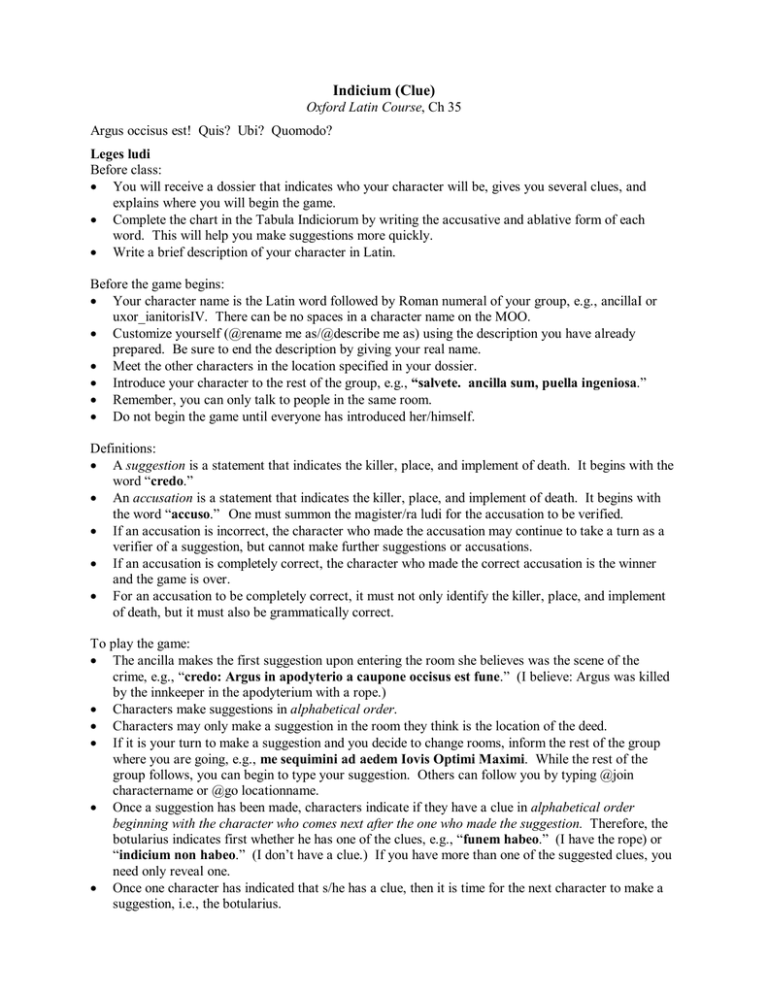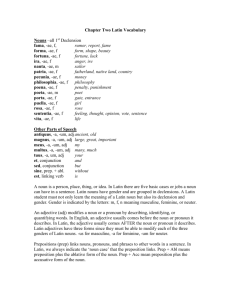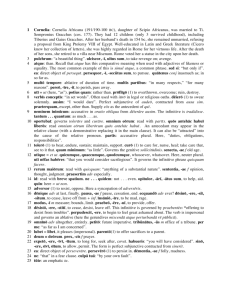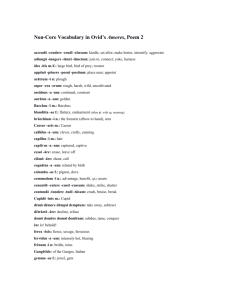Indicium (Clue)
advertisement

Indicium (Clue) Oxford Latin Course, Ch 35 Argus occisus est! Quis? Ubi? Quomodo? Leges ludi Before class: • You will receive a dossier that indicates who your character will be, gives you several clues, and explains where you will begin the game. • Complete the chart in the Tabula Indiciorum by writing the accusative and ablative form of each word. This will help you make suggestions more quickly. • Write a brief description of your character in Latin. Before the game begins: • Your character name is the Latin word followed by Roman numeral of your group, e.g., ancillaI or uxor_ianitorisIV. There can be no spaces in a character name on the MOO. • Customize yourself (@rename me as/@describe me as) using the description you have already prepared. Be sure to end the description by giving your real name. • Meet the other characters in the location specified in your dossier. • Introduce your character to the rest of the group, e.g., “salvete. ancilla sum, puella ingeniosa.” • Remember, you can only talk to people in the same room. • Do not begin the game until everyone has introduced her/himself. Definitions: • A suggestion is a statement that indicates the killer, place, and implement of death. It begins with the word “credo.” • An accusation is a statement that indicates the killer, place, and implement of death. It begins with the word “accuso.” One must summon the magister/ra ludi for the accusation to be verified. • If an accusation is incorrect, the character who made the accusation may continue to take a turn as a verifier of a suggestion, but cannot make further suggestions or accusations. • If an accusation is completely correct, the character who made the correct accusation is the winner and the game is over. • For an accusation to be completely correct, it must not only identify the killer, place, and implement of death, but it must also be grammatically correct. To play the game: • The ancilla makes the first suggestion upon entering the room she believes was the scene of the crime, e.g., “credo: Argus in apodyterio a caupone occisus est fune.” (I believe: Argus was killed by the innkeeper in the apodyterium with a rope.) • Characters make suggestions in alphabetical order. • Characters may only make a suggestion in the room they think is the location of the deed. • If it is your turn to make a suggestion and you decide to change rooms, inform the rest of the group where you are going, e.g., me sequimini ad aedem Iovis Optimi Maximi. While the rest of the group follows, you can begin to type your suggestion. Others can follow you by typing @join charactername or @go locationname. • Once a suggestion has been made, characters indicate if they have a clue in alphabetical order beginning with the character who comes next after the one who made the suggestion. Therefore, the botularius indicates first whether he has one of the clues, e.g., “funem habeo.” (I have the rope) or “indicium non habeo.” (I don’t have a clue.) If you have more than one of the suggested clues, you need only reveal one. • Once one character has indicated that s/he has a clue, then it is time for the next character to make a suggestion, i.e., the botularius. TABULA INDICIORUM GROUP I Accusative Ablative ancilla -ae, F., maid ___________ ____________ botularius -ii, M., sausage-seller ___________ ____________ caupo -onis, M., innkeeper ___________ ____________ matrona -ae, F., married woman ___________ ____________ miles militis, M., soldier ___________ ____________ uxor ianitoris, F., wife of the doorkeeper ___________ ____________ funis -is, M., rope ___________ ____________ gladius -ii, M., sword ___________ ____________ pugio -onis, M., dagger ___________ ____________ retia -ium, N. Pl., nets, traps ___________ ____________ saxa -orum, N. Pl., rocks ___________ ____________ tegula -ae, F., roof tile ___________ ____________ venenum -i, N., poison ___________ ____________ apodyterium ___________ ____________ calidarium ___________ ____________ frigidarium ___________ ____________ natatio ___________ ____________ nymphaeum ___________ ____________ palaestra quadrata ___________ ____________ palaestra rotunda ___________ ____________ tepidarium ___________ ____________ Dramatis Personae Instrumenta mortis Loca facti: Balneae (Reg. III): Indicium, adapted for VRoma by John Gruber-Miller and Cindy Benton, Cornell College TABULA INDICIORUM GROUP II Accusative Ablative ancilla -ae, F., maid ___________ ____________ botularius -ii, M., sausage-seller ___________ ____________ caupo -onis, M., innkeeper ___________ ____________ matrona -ae, F., married woman ___________ ____________ miles militis, M., soldier ___________ ____________ uxor ianitoris, F., wife of the doorkeeper ___________ ____________ funis -is, M., rope ___________ ____________ gladius -ii, M., sword ___________ ____________ pugio -onis, M., dagger ___________ ____________ retia -ium, N. Pl., nets, traps ___________ ____________ saxa -orum, N. Pl., rocks ___________ ____________ tegula -ae, F., roof tile ___________ ____________ venenum -i, N., poison ___________ ____________ aedes Iovis Optimi Maximi ___________ ____________ area Capitolina ___________ ____________ chalcidicum ___________ ____________ curia ___________ ____________ gradus curiae ___________ ____________ porticus curiae ___________ ____________ rostra ___________ ____________ Dramatis Personae Instrumenta mortis Loca facti: Forum (Reg. VIII): Vocabulary: porticus -us, F., portico. Indicium, adapted for VRoma by John Gruber-Miller and Cindy Benton, Cornell College TABULA INDICIORUM GROUP III Accusative Ablative ancilla -ae, F., maid ___________ ____________ botularius -ii, M., sausage-seller ___________ ____________ caupo -onis, M., innkeeper ___________ ____________ matrona -ae, F., married woman ___________ ____________ miles militis, M., soldier ___________ ____________ uxor ianitoris, F., wife of the doorkeeper ___________ ____________ funis -is, M., rope ___________ ____________ gladius -ii, M., sword ___________ ____________ pugio -onis, M., dagger ___________ ____________ retia -ium, N. Pl., nets, traps ___________ ____________ saxa -orum, N. Pl., rocks ___________ ____________ tegula -ae, F., roof tile ___________ ____________ venenum -i, N., poison ___________ ____________ Dramatis Personae Instrumenta mortis Loca facti: Domus Paulli et Corneliae (Reg. III): bibliotheca ___________ ____________ cubiculum ___________ ____________ culina ___________ ____________ exedra ___________ ____________ peristylium ___________ ____________ tablinum ___________ ____________ triclinium ___________ ____________ Indicium, adapted for VRoma by John Gruber-Miller and Cindy Benton, Cornell College TABULA INDICIORUM GROUP IV Accusative Ablative ancilla -ae, F., maid ___________ ____________ botularius -ii, M., sausage-seller ___________ ____________ caupo -onis, M., innkeeper ___________ ____________ matrona -ae, F., married woman ___________ ____________ miles militis, M., soldier ___________ ____________ uxor ianitoris, F., wife of the doorkeeper ___________ ____________ funis -is, M., rope ___________ ____________ gladius -ii, M., sword ___________ ____________ pugio -onis, M., dagger ___________ ____________ retia -ium, N. Pl., nets, traps ___________ ____________ saxa -orum, N. Pl., rocks ___________ ____________ tegula -ae, F., roof tile ___________ ____________ venenum -i, N., poison ___________ ____________ cavea ___________ ____________ orchestra ___________ ____________ peristylium ___________ ____________ porticus Octaviae (gateway of) ___________ ____________ scaena ___________ ____________ vomitorium ___________ ____________ Dramatis Personae Instrumenta mortis Loca facti: Campus Martius (Reg. IX): Vocabulary: porticus -us, F., portico. Indicium, adapted for VRoma by John Gruber-Miller and Cindy Benton, Cornell College




